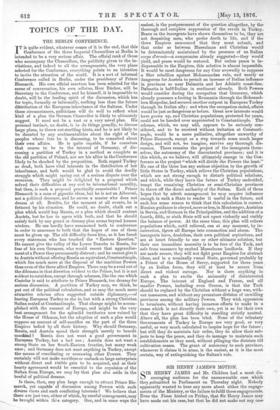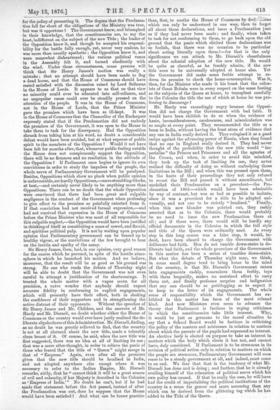SIR HENRY JAMES'S MOTION.
SIR HENRY JAMES and Mr. Childers had a most dis- couraging audience for the unanswerable case which they pubmitted to Parliament on Thursday night. Nobody apparently wanted to hear any more about either the engage- ments of the Ministry, or the failure to fulfil those engagements. Even the Times hinted on Friday, that Sir Henry James may have made out his case, but that he did not make out any case • for the policy of presenting it The dogma that the Proclama- tion fell far short of the obligations of the Ministry was true, but was it opportune ? The Government knew, and triumphed in their knowledge, that the constituencies are, to say the least, indifferent on the subject of the new Title ; the leader of the Opposition knew it, and though he accepted his responsi- bility for the battle fully enough, yet, never very zealous, he was more than usually apathetic ; the Opposition knew it, and were somewhat disheartened ; the various political vanes in the Assembly felt it, and turned obediently with the wind, tinder these circumstances, some persons will think that Sir Henry James's motion was really a mistake ; that no attempt should have been made to flog a dead horse and that the House of Commons should have rested satisfied with the discussion raised by Lord Selborne in the House of Lords. It appears to us that on that view no minority could ever be educated into self-reliance, and no unpopular cause could ever be steadily pressed on the attention of the people. It was in the House of Commons, not in the House of Lords, that the Prime Minister gave the promises which have been so ill-kept. It was in the House of Commons that the Chancellor of the Exchequer expressly stated that if the Proclamation did not embody the promises of the Government, it was open to the House to take them to task for the discrepancy. Had the Opposition shrunk from taking him at his word, no doubt a considerable defeat would have been avoided, but at what expense of public spirit to the members of the Opposition ? Would it not have been felt for months after, that, whenever public feeling outside the House does not conspicuously support the Opposition, there will be no firmness and no resolution in the attitude of the Opposition ? If Parliament once begins to ignore its own convictions in order to study the impulses of the people, the • whole nerve of Parliamentary Government will be paralysed. Besides, Oppositions which show no pluck when public opinion is unfavourable, are hardly Oppositions,—mere stumbling-blocks, at best,—and certainly never likely to be anything more than Oppositions. There can be no doubt that the whole Opposition were . convinced that there had been great and culpable negligence in the conduct of the Government when professing to give effect to the promises so painfully extorted from it. If that conviction had not received formal expression,—and had not received that expression in the House of Commons before the Prime Minister who was most of all responsible for • this culpable neglect,—the Opposition would have been justified in thinking of itself as constituting a mass of cowed, and flaccid, and spiritless political pulp. It is not by waiting upon popular opinion that Parliamentary government can be braced up to healthy vigour, or the convictions of the few brought to bear on the inertia and apathy of the many.
Sir Henry James, then, had, in our opinion, very good reason for the course which he pursued, in spite of the hostile atmo- sphere in which he launched his motion. And we believe, moreover, that the result will be as good as his ground was strong. No one who reads the debate of Thursday night will be able to doubt that the Government was not even careful to attempt a justification of its shortcomings. It treated the whole matter with a vague scorn for all precision, a naïve wonder that anybody should expect accurate fidelity in conforming to explicit engagements, phich will presently have their effect, both in shaking the confidence of their supporters and in strengthening the active distrust of their opponents. Without the speeches of Sir Henry James and Mr. Childers, and the answers of Mr. Hardy and Mr. Disraeli, we doubt whether either the House of Commons or the country would ever have justly realised the de- liberate slipshodness of this Administration. Mr. Disraeli, finding, as no doubt he was greatly relieved to find, that the country is not at all alarmed about the new title, made a tolerably clean breast of it. Of course, he said, when the new title was first suggested, there was no idea at all of limiting its use ; that was a mere after-thought, in order to relieve the panic of those who feared that the title of " Queen " might merge in that of "Empress." Again, even after all the promises given that the new title should be localised in India, and not adopted anywhere else except where it was necessary to refer to the Indian Empire, Mr. Disraeli • remarks, airily, that he " cannot think it will be a great source of evil and calamity, if her Majesty is described in the Colonies as 'Empress of India." No doubt he can't, but if he had made that statement before the Act passed, instead of after the Proclamation was out, does he suppose that the House • would have been satisfied ? And what can be looser practice than, first, to soothe the House of Commons by decl- —ions which can only be understood in one way, then to forget all about those declarations, and issue a Proclamation j ust as if they had never been made ; and finally, when taken to task for not conforming to them, to go back upon the old ground that the panic which elicited those declarations was so foolish, that there was no occasion to be particular about acting literally upon them I—for that is the only significance we can attach to Mr. Disraeli's cheerfulness about the colonial adoption of the new title. He would be quite as cheerful, as he frankly admits, if the new title were to be universally adopted at home also. Yet the Government did make some feeble attempt to re- deem its promise to check the home-consumption. Was it, then, for the Minister who made it his boast that the colon- ists of Great Britain were in every respect on the same footing as the subjects of the Queen at home, to transplant carefully to the Colonies the title the use of which at home he was pro- fessing to discourage?
Mr. Hardy was exceedingly angry because the Opposi- tion did not charge the Government with bad faith. It would have been childish to do so when the evidence of haste, inconsiderateness, carelessness, and miscalculation was so ample at every point. They recommended the title as a boon to India, without having the least atom of evidence that any one in India really desired it. They eulogised it as a good recipe against the advancing power of Russia, when they found that no one in England really desired it. They had never thought of the probability that the new title would " im- perialise " the Princes and Princesses and all the agnates of the Crown, and when, in order to avoid this mischief, they took up the task of limiting its use, they never realised the difficulty of doing so without embodying those limitations in the Bill ; and when this was pressed upon them, in the haste of their proceedings they not only refused to recast the Bill and passed it without amendment, but modelled their Proclamation on a precedent—the Pro- clamation of 1801—which would have been admirable by way of contrast, but was as bad as possible to imitate, since it was a precedent for a title to be adopted uni- versally, and not one to be strictly "localised." Finally, when this new blunder was pointed out, they rashly asserted that as to the Colonies, there would probably be no need to issue the new Proclamation there at all ; and if there were, there would still be hardly any official documents in the Colonies in which the full style and title of the Queen were ordinarily used. As every step in this long course was a false step, it would, in- deed, have been absurd to charge the Government with deliberate bad faith. Men do not tumble down-stairs in de- liberate bad faith, and the whole procedure of the Government in this matter has been a series of tumbles down-stairs. But what the debate of Thursday night may, we think, in some small degree tend to bring home to the mind of the country, is that Mr. Disraeli's Government enters into engagements rashly, remembers them feebly, toys with them languidly, makes no sustained effort to carry them out, .and finally professes surprise and indignation that any one should be so pettifogging as to expect it to keep to the letter of its engagements. The whoie sense of responsibility which the Government has ex- hibited in this matter has been of the most relaxed kind. And now Ministers even seem to advance the theory that Parliament is factious in urging criticisms in which the constituencies take little interest. Why, it would be just as germane to the moral situation to say that a School Board would be factious in criticising the policy of the masters and mistresses in relation to matters about which the parents of the pupils had expressed no interest. An elective body is elected on purpose to take an interest in matters which the body which elects it has not, and cannot have, duly considered. If Parliament is to be strenuous in its revision of political action only in relation to matters on which the people are strenuous, Parliamentary Government will soon cease to be a steady government at all, and indeed, must come to an end. We fear that that is the tendency of what Mr.
Disraeli has done and is doing ; and further, that he is already availing himself of the relaxation of political nerve which his own policy has caused. If that be really the case, he will have had the credit of imperialising the political institutions of the country in a sense far graver and more menacing than any which can be derived from the glittering tag which he has added to the Title of the Queen.



































 Previous page
Previous page